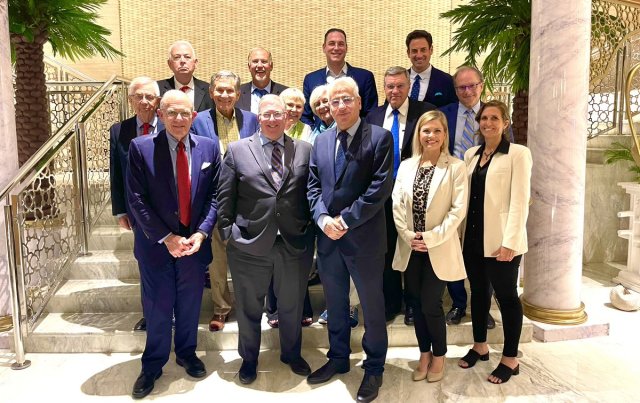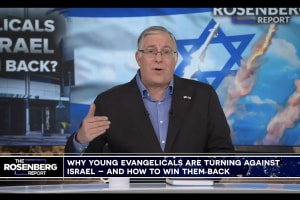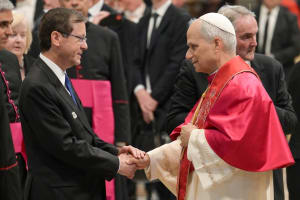‘I didn’t come here to waste my time:’ Israel’s ambassador to UAE is a businessman, not a career diplomat
Amir Hayek tells Evangelical delegation that Abraham Accords partnerships can go one of two ways: “successful or very successful”

ABU DHABI, United Arab Emirates—Like most teenagers, Amir Hayek was mortified when his parents – Jewish Iraqi immigrants to Israel – listened to classical music, iconic Arabic singers such as Fairouz and Umm Kulthum.
And he showed his disdain by playing Bruce Springsteen and Jethro Tull.
But those eastern roots were reawakened when Hayek – handpicked by Israeli Foreign Minister Yair Lapid – became his country’s first-ever ambassador to the UAE. Suddenly, he found himself in Abu Dhabi surrounded by the very culture of his parents.
“Now I’m blasting Fairouz with open windows while I’m driving around the country,” he said.
Hayek – chosen for his business and economics background – fit right into his new role in many ways. The culture, it seems, was in his genes.
“I felt I came to my parents’ neighborhood,” Hayek said of his arrival in the UAE capital six months ago. “I felt very comfortable, at home.”
Hayek spoke about his new role while meeting with a delegation of Evangelical business and media leaders on an Abraham Accords tour organized by ALL ISRAEL NEWS Editor-in-Chief Joel Rosenberg. Hayek explained his unique strategy in building this new official diplomatic office.
“It’s no secret that we had a relationship with the UAE, but it was in the dark,” he said.
Now, relations are progressing in the open – and they are on a fast track.
This is probably why Lapid chose a businessman instead of a career diplomat to fill the role since the financial aspects of the Abraham Accords are racing ahead at mach speed.
“With his vast experience and knowledge in the fields of economy and tourism, Amir Hayek is the right person to establish the bridge between Israel and the Emirates. Following the opening of the embassy, the time has also come to appoint the first ambassador to the United Arab Emirates,” Lapid said in a statement back in July.

According to his LinkedIn page, Hayek was president of the Israel Hotel Association; founder and CEO of BRT Global; chairman of TAMIR Packaging recycling corporation in Israel; CEO of Manufacturers Association of Israel; president and CEO of Electronics Line 3000; president of Tescom; CEO of the Ministry of Industry Trade and Labor and CEO of Israel Export Institute.
Upon accepting Lapid’s appointment, Hayek said the UAE “is an entire world of joint economic opportunity.”
“I have no doubt I will have the full cooperation of all government ministries and together, we will succeed in establishing diplomatic and economic cooperation between both countries,” he said at the time.
Hayek replaced Eitan Na’eh, who held the post on a temporary basis, a few months after the signing of the Abraham Accords. Na’eh has since started up Israel’s embassy in Manama, Bahrain where he now serves.
Now Hayek, with a half a year on the job, said the two countries are navigating a learning curve about how the other does business – “Israelis answer before reading, and Emiratis read before answering” – but in general, the pace is meteoric.
“We started running fast and we are only going to run faster. I didn’t come here to waste my time,” Hayek said.
Prior to the Abraham Accords, the quickest Israel ever signed a free trade agreement was 18 months. However, the Jewish state signed one with the UAE in just six months, Hayek said, setting a new record.
“I’m very lucky to take part in this start up, which I guarantee will be unicorn,” Hayek said, referring to start-ups valued over $1 billion.
Indeed, the approach of forging ties between Israel and the UAE has been largely business and results oriented.
“When I tell an Emirati I’m not a career diplomat, he relaxes,” Hayek said.
And he predicts great prospects for the future: “Either we will be successful. Or we will be very successful.”
Already by November, bilateral trade between Israel and Dubai had reached $700 million in just over a year.
“We have this huge amount of trade [even though] Israel was closed completely for foreigners, and sometimes for Israelis, too, up to Nov. 1, because of COVID-19. It only proves that once the doors are opened, we are going to have a surge of more business going back and forth,” said Ilan Sztulman Starosta, the Israeli consul-general in Dubai.
And it’s not just business. Memoranda of Understanding are coming about in banking, licensing for drivers and doctors and even programs for people with disabilities (known as people of determination in the UAE).
Beyond that, the gates of tourism are open and thriving. Even with intermittent COVID restrictions since the two nations shook hands in September 2020, more than 400,000 Israelis have already traveled to the UAE.
The international cooperation has allowed international flights to and from Tel Aviv over Saudi Arabia. This has enabled Israeli travelers to save several hours on flights to the Far East, connecting through the UAE and Bahrain.
Officials in all three countries that Rosenberg's delegation met with – Israel, Bahrain and the UAE - believe successes like these will draw other countries into the Abraham Accords.

Nicole Jansezian was the news editor and senior correspondent for ALL ISRAEL NEWS.













